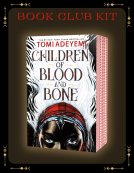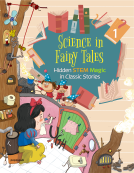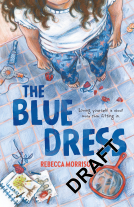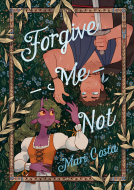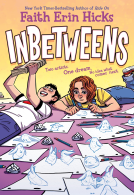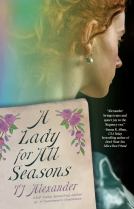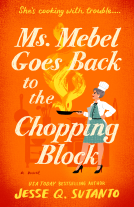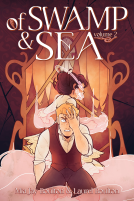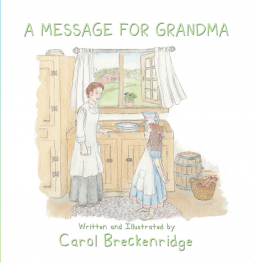
A Message for Grandma
by Carol Breckenridge
This title was previously available on NetGalley and is now archived.
Send NetGalley books directly to your Kindle or Kindle app
1
To read on a Kindle or Kindle app, please add kindle@netgalley.com as an approved email address to receive files in your Amazon account. Click here for step-by-step instructions.
2
Also find your Kindle email address within your Amazon account, and enter it here.
Pub Date Jul 21 2017 | Archive Date Nov 30 2017
Description
This is a gentle story about Alice, a young girl living in western Pennsylvania in the 1890s. Alice's mother sends her with a message to her German-speaking Grandma on the other side of the family farm. Alice speaks only English. As she walks across the farm repeating the message so that she will remember, she mangles it more with each new experience. Happily she gets it right at Grandma's house.
Author_Bio: Carol Breckenridge is an artist, illustrator, and art therapist. A former elementary school teacher, she worked for 20 years as an art therapist in mental health centers, and continues to supervise art therapy interns at Ursuline Colleges. She sells her art through BreckWorks at Etsy.com. Carol now has 8 grandchildren of her own, but long ago her own grandmother told her that she had often been sent across the family farm with a message in German for her immigrant grandma. She lives in Shaker Heights, Ohio with her husband and schnauzer.
Keywords: Girl, Grandma, Children, Pioneer, Farm, Cow, Goose, Dog, Pictures, Watercolor
A Note From the Publisher
Keywords: Girl, Grandma, Children, Pioneer, Farm, Cow, Goose, Dog, Pictures, Watercolor
Available Editions
| EDITION | Ebook |
| ISBN | 9781506904016 |
| PRICE | 5.99 |
Average rating from 25 members
Featured Reviews
 R S, Reviewer
R S, Reviewer
The idea is fun, though pretty implausible. We don't know how old is Alice, but as long as she's able to talk with her grandma and intuitively understand that "Ich liebe dich" means "I love you" she'll probably learn to speak German in no time and be able to use whatever are the German words for flour, dinner, bread or pie. Children learn very easily this kind of things.
However, let's play along and pretend Alice doesn't speak German. She gets the message from her mom and off she goes to grandma's. Trying to remember what she has to say, Alice keeps repeating the words but she's constantly altering them. That was supposed to be fun but there are about 12 pages of slight variations of "Can I itch my borgen?" and it's waaay too much. A couple would suffice for some laughs.
Or perhaps it's meant to teach about farm life, since Alice changes the message every time she sees an animal.
 Jeanette S, Reviewer
Jeanette S, Reviewer
I can see that this children's book is going to be popular with my younger grandchildren! Such a lovely story of a young girl on her way to visit her grandma with a message. A German message that she tried hard to remember. I could feel the warmth and love of her grandma upon her arrival. Loved the illustrations.
My thanks to Netgalley and the Publishers for my copy. This is my honest review.
This is a lovely concept, the idea of the game of telephone, but played with only one person. A child is sent to deliver a message in German to her German speaking grandmother, and she has to walk the whole way from one side of the farm to the other.
As I have said, the concept is good, but why, oh why was no translation given for the sentence the girl had to memorize. Or for what her grandmother said when she garbled the message. And perhaps that wasn't important, but to end on that note?
We need good editors.
I would have rated this lower, but I think it has potential.
It could be learning about German. It could have been how the girl could have gotten her message across with mime, even though she had garbled the message. It could have been better. And perhaps it will be, but in its present form, it is tiring, and annoying.
Thanks to Netgalley for making this book available for an honest review.
Cute story. Kids can so easily be distracted. Fun to follow the journey of a simple task and how it changes as the events of the day progress. Would recommend.
 Cherry-Ann L, Reviewer
Cherry-Ann L, Reviewer
Little Alice was given an all important message to take to her Grandma, the sad thing is that Alice could not speak a word in German, which the message was in and her Grandma could only speak German. So there you have the confusion poor Alice she had to memorize the message her mother gave her which got twisted many ways by the time she met her granny. I wonder if her mother ever got her flour. An interesting story but it leaves you wondering.
 Producervan E, Reviewer
Producervan E, Reviewer
Wonderful little story about a close-knit family’s child who is sent to deliver a message to her German immigrant grandma and the language gap they experienced. Despite their language differences, Grandma’s love was readily expressed and immediately understood. Soothing illustrations with the pastel charm of Beatrix Potter. Highly recommend. Thanks to NetGalley for providing this ebook for review
I am always excited when I find a children's book that helps the reader learn about his/her heritage. I grew up on a farm with my German-speaking grandmother living nearby. Luckily, my grandmother could also speak English so I did not have to speak German to communicate with her.
The author makes it clear that each member of the farm family had to work hard to support the family. Alice and her nine brothers and sisters all had chores to do each day. Alice's mother needed flour to bake bread, so she asked Alice to walk to the other side of the farm and give her grandmother the following message, "Kann ich Mehl borgen".
It is no surprise that Alice had trouble remembering these German words. The German phrase soon turned into, "Ich kann my burden?" and "Kann is meal burger," and "I kann itch my bottom."
By the time Alice arrived at her grandmother's house, she remembered the German phrase her mother gave her. Unfortunately, the grandmother answered in German and the reader is not given the English meaning. The story ends with Alice getting a big hug from her grandmother, so I assume she got the flour and was soon on her way home.
The story is illustrated with soft watercolor paintings that add value to the story.
I am giving this story a four star rating because of the uncertain ending. It is a good story to share with children to teach about immigrants and American history. Kids will love the humor and relate to Alice's memory difficulties.
MY RATING: 4 STARS OUT OF 5
FYI - I received a digital review copy of this book from Net Galley.
 Ryan A. F, Librarian
Ryan A. F, Librarian
On a farm with a big family, the patriarch Grandma can not speak English, and her grandchildren, can't speak German. Her Granddaughter is set to give grandma a message and tries to remember the language she doesn’t know. This story goes nowhere. The author uses German term and never gives the English equivalent. Even the story ends abruptly without Alice ever realizing she might need to learn German.
 Sarah l, Educator
Sarah l, Educator
A really sweet book. I love the idea of Chinese whispers and how the main character managed to convey her message to her grandmother.
A funny story to show kids the difficulty of a language barrier, and the importance of learning other languages. Alice only speaks English, her grandma only speaks German. Follow Alice to her grandmother's house while she tries to remember her mother's message with the many interruptions that come her way.
 Laura H, Reviewer
Laura H, Reviewer
On the first page of the book I noticed that numbers below ten were written as digits rather than words - a small detail but technicalities of writing are important to me.
The story is lovely; Alice has both German and English speakers within her family, and she delivers a message from her mother to her grandma, and along the way the message gets translated. There are some bits of German which is great to see from a learning perspective, but it would be helpful if all of the German dialogue had direct translations - what use is reading German if the child does not know what it translates to? Also, the phonetic spelling in brackets could have been put in italics to identify it as separate from the main story.
On the whole I really enjoyed this story and I would love to see more books of this type, teaching young people little snippets of other languages.
 Christina T, Reviewer
Christina T, Reviewer
Alice is asked by her mother to go to her grandmother's house and ask to use some of her flour to make bread for dinner. Only, Alice's grandmother does not speak English like Alice but German. Having been told the correct words to say to her grandmother Alice makes the trip across her family's land reciting the phrase over and over. However, like most little girls, Alice gets distracted over and over as she makes the journey to grandma's home. These distractions aid in her mispronouncing and changing the words around all along the way.
There's no surprise to find that when she arrives she doesn't need to practice over and over hearing the love her grandmother shares. It simply transcends the language barrier.
 Paul F, Reviewer
Paul F, Reviewer
In the 1890s three branches of the same family share a farm, with each having double-digit children; that’s a lot of cousins! Grandma also lives on the farm, one of the original immigrants who never learned to speak English, whereas the third generation Alice—the little protagonist—belongs to doesn’t speak German. Alice is tasked with going to Grandma’s house to get some flour—not borrow it, as it says in the book—but has to memorize how to say it in German. The verbal contortions she gets into trying to remember the phrase as she travels the roads and paths are hilarious, especially when the goose chases her and she screams, “Can’t nip my bottom!”
Though it’s mostly text, there are some beautiful high-tone barely-there paintings, mostly farm scenes. It’s a sweet story, funnier than expected, but I have to mention that even though I don’t know much German, I do know “I love you,” and the pronunciation given is wrong.
The story was cute but I was a little confused. The style seems to be aimed at young kids, but the length is more towards just under middle grade. Some parts of the story seemed confusing and random as well. The illustrations were nice, and Alice's attempts at remembering the words are cute too.
 Jennifer C, Reviewer
Jennifer C, Reviewer
It was an adorable experience reading this book. It reminded me a little of the game of telephone instead with a German message to remember. Amusing, funny, silly, but heartwarming!
Thank you to Carol Breckinridge, First Design Publishing, and Netgalley, for the opportunity to read and review this book.
 Rogene C, Educator
Rogene C, Educator
An excellent and succinct little story that really was a crowd pleaser.
 Ruth F, Educator
Ruth F, Educator
A great story about a little girl's adventure across her families farms to take a message in German for her grandma, she keeps up with her responsibility despite many adventures and possible distractions. A wonderful ending for the young serves to highlight how the language of love can be universal despite generational gaps and reluctance to learn the “old tongue”.
 catherine h, Reviewer
catherine h, Reviewer
I'm a first generation of German immigrants and this is sort of my story, too! My German leaves a lot to be desired, but I can remember my Grandmother, who spoke little English at the time, giving me messages to my non-English speaking grandfather in German! Ans my own mother asking me to deliver German messages to her parents, too! My first generation cousins, ans all of our second generation American kids, are going to love this story (I'm buying all of us copies). I know there are quite a few of us first generation German-Americans out there and most of us are growing old, our children would appreciate this story as much as us! Great tale! Kudos Carol Breckenridge!
 Pat M, Reviewer
Pat M, Reviewer
3★
Lovely illustrations (see the cover) of a funny little story about a family who came from Germany, multiplied and expanded on a family farm, and now has three generations. Grandma speaks only German; Momma speaks German and English; the grandchildren speak only English.
Momma needs some flour and sends young Alice to travel across the fields to Grandma’s house with a four-word message in German to ask for some flour. “Kann ich Mehl borgen. (kahn ik mel borgin)”
Alice gets distracted. Of course she does – she’s a kid, wandering around free, running an errand. But there are so many interesting things to look at! And they all interrupt her constant repetition of her German message, making her remember wrong words and corrupting it in funny ways.
At one point, it becomes “Can I itch my meal burger?” Silly, of course, but young readers will love the variations, and the illustrations are cute.
I do have a gripe about the German. Even though mine is rusty, I’m aware of the different accents in Germany, but it seemed odd that Momma and Grandma pronounced “ich” differently. Momma uses the hard “k” sound while Grandma uses the soft “ish” sound.
As for Alice, her mistakes are all based on the visual spelling of “ich”, not on either “ik” or “ish”, which is why they ended up as "itch" so often.
I also thought it was a bit unrealistic that the proper German phrase would have popped back into Alice’s head when she got to Grandma’s, but maybe I’m being too fussy.
It would have been nice if the author had translated all the German phrases rather than just transliterate them so readers can pronounce them without knowing what they’re saying.
 Amber W, Educator
Amber W, Educator
I am confident that this book holds some type of sentimental value for the author. The message for Grandma took many twists and turns throughout the story and it was a classic game of telephone. But somehow in the end the granddaughter hit the message right and the Grandma responded with a big I Love You! While the story was cute it lacked connected substance and wasn't a book that grabbed and held my attention.
Readers who liked this book also liked:
L.M Montgomery
Children's Fiction, Comics, Graphic Novels, Manga, Teens & YA
We Are Bookish
General Fiction (Adult), New Adult, Romance
We Are Bookish
Sci Fi & Fantasy, Teens & YA
DongA Science
Children's Fiction, Middle Grade, Science
Mia Jay Boulton; Laurel Boulton
Comics, Graphic Novels, Manga, Romance, Sci Fi & Fantasy







